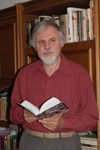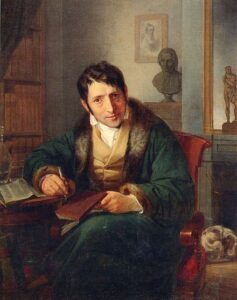By Alex Gordon


HAIFA, Israel — A person born and raised in a ghetto or in the Jewish Pale of Settlement in Tsarist Russia and released from there by emancipation cannot bear the thought of returning to the past. Long before the inclusion of Jews in revolutions in Russia, Germany and Hungary, nineteenth-century ghettos raised Jewish fighters against despotism and Jewishness and crystallized a “Bolshevik” consciousness.
Ludwig Börne (Yehuda-Leib Baruch), German publicist, was born in 1786 and grew up in the ghetto of Frankfurt. He was in early opposition to the German rulers and was one of the fighters for freedom from German despotism. Börne attributed his desire for freedom to the double oppression he experienced as a Jew and as a German: “Because I was born a slave, I love freedom more than you. Because I was born a slave, I understand freedom better than you.”
He was 11 years older than Heinrich Heine. Both were brilliant with the pen. Both were hostile to aristocracy, theocracy and the bourgeoisie. Both became doctors of law. Both fled to Paris to escape German reaction. Both were baptized at the age of 27. Heine was ashamed of his act and, laughing bitterly at his baptism, once told Balzac, “I was sprinkled, but not baptized.”
Ludwig Börne received a Jewish education, but he hated it because it was associated with life in the ghetto. He described his belonging to the Jews as follows: “I am glad that I am a Jew. It makes me a citizen of the world, and I should not be ashamed of being a German egoist, […] I can appreciate the undeserved happiness of being both a German and a Jew, of being able to share the virtues of Germans but not their faults.” Börne intended the Jews to be the leaders of cosmopolitanism: “They [the Jews] are the teachers of cosmopolitanism. The whole world is their school. For this reason, they are teachers of freedom.” He justified his cosmopolitanism by his origins.
To those of his opponents, who reproached him for his Jewish origins, Börne said: “Yes, because I did not have any native land at birth, I want it much more than you do, and since the place where I was born was limited to a Jewish street, beyond the locked gates of which a new land began for me, it is not enough now to have as native land neither a city, nor a province, nor an entire region: I can only be content with the whole great fatherland, in all the space where its language sounds.”
Börne was not only an opponent of the nation-state, in which his role as a Jew was secondary in origin, but also an opponent of the state as such. At a time when the idea of the Hegelian state reigned supreme in Germany, he called for a weakening of state power.
Börne was indifferent to the Jewish people, but advocated their emancipation. His biographer, Bertha Porozowsky, comments on his motives this way: “If for the rest of his life he did not cease to fight ardently in word for the emancipation of his countrymen, it was by no means a consequence of a special disposition toward them. The Jews themselves, with their direction at the time, were even directly antipathic to him – in most cases he saw them only as men of money and numbers.” His cosmopolitan stance is captured in the words: “I love neither Jew nor Christian, I love them only because they are human and born for freedom.”
According to Börne, the most important contribution of Jewry to world civilization was that it gave rise to the “high ideals” of Christianity, with the rise of which the Jews lost the right to a national existence, and their mission now consists in the realization of cosmopolitan ideas. For Börne, the Jews were the “waste material” of history.
Börne considered the German people freedom-loving: “They [the German people] were incited to abuse their freedom in order to be able to say that they were not worthy of freedom; they were made the jailer of the Jews on the grounds that being in prison was equally obligatory for both jailers and prisoners.” Under Nazi rule, it was the will of the majority of German society that the Germans became not only the jailers but also the greatest executioners of the Jews in history.
In September 1831, Börne presented his views on the revolution at the Hotel de Castille in Paris to his guest, the German disgraced poet Heinrich Heine, who had recently migrated to Paris: “Revolution is a terrible thing, but it is as necessary as the amputation of rotten organs.” Börne stunned Heine with his demand to cut off as many heads as possible for the success of the revolution. According to the poet, Börne was an “acrimonious, dry and bloodthirsty” man. Börne was one of the most vivid, incisive, scathing social critics in Germany. Heine called his pen a “steam guillotine” and his own a “regular guillotine.” Heine was a harsh critic of German reaction, but was embarrassed to be put on the same footing as Börne and other radicals. He valued freedom in everything, including freedom from revolution.
Wilhelm Marr, a baptized half-German half-Jew who invented the term “anti-Semitism” and became one of the ideologues of the new racist movement in Germany, belonged to the radical left in the 1820s and 1830s, as did the composer Richard Wagner. He recalled: “Heine and Börne were our prophets. These Jews were the founders of freedom at a time when stupid and hypocritical reaction ruled.” Another ideologist of antisemitism, the historian Heinrich von Treitschke, noted that with Heine and Börne the entrance of Jews into German literature began, and called their activities “a barren and ugly pause” in literature. Nationalist Germans accused them of a lack of patriotism. Jews, on the other hand, saw Heine and Börne as enemies of emancipation, because they believed that the oppositional activities of both writers against the “fatherland” were detrimental to German Jewry.
For the sake of the revolution, Börne turned a blind eye to the Judophobia of German revolutionary movements. He counted on German antisemites to contribute greatly to the socialist revolution in Germany. He wrote: “I forgive the German people their hatred of the Jews, for they are still a young people. The Germans, like children, need mutual support [that is, the warming of unifying nationalist and anti-Semitic sentiments] in order to stand upright on the bench on their own feet. Germans need restrictions on freedom so that one day they will be able to act without these restrictions.”
He saw antisemitism as a consequence of the helplessness of the German nation. Heine despised “the chauvinist champions of the nation, our nationalists, the so-called patriots, whose heads are full of race, blood and similar nonsense.” The poet disliked the nationalist crowd: “The words ‘homeland’, ‘Germany’, ‘the faith of our fathers’ and so on electrify the stupefied heads of the masses much more than the words ‘humanism’, ‘cosmopolitanism’, reason and truth!” Heine called for the liberation of the people, but he disliked pretenders to the role of liberators. He called “the peasantry” “the most disgusting dictator.” The poet believed that whoever called the Germans to revolution, “sooner or later it will lead to terrible results,” to “events, in comparison with which the French Revolution will seem a harmless idyll.”
Börne ‘s views were straightforwardly radical. He believed in the possibility of a unified, supra-class German republic, built on the principles of liberty, equality and fraternity. Franz Möhring, one of the leaders of the Second International and Marx’s biographer, wrote of Börne: “In public life there are scarcely any worse Jesuits than limited radicals.”
Heinrich Heine did not grow up in the ghetto like Börne, but in the free atmosphere in which the Jews of Düsseldorf lived. It was in the ghetto of Frankfurt that Börne, a radical and straightforward man, a revolutionary determined to bloodshed, was formed. Jewish ways lead from the ghettos and localities to the stage of the revolutionary scene.
Like a straightened spring, the parochial revolutionary shoots out of the ghetto life that crushed him with religious and national imperatives. Leon Trotsky from the village of Yanovka in the Kherson region and Ludwig Börne from the Frankfurt ghetto rise to the world revolution. The fall of the ghetto walls and the boundaries of the settlements released a tremendous energy that was directed toward the destruction of the old world and the destruction of Jewish spiritual life.
*
Alex Gordon is a native of Kiev, Ukraine, and graduate of the Kiev State University and Haifa Technion (Doctor of Science, 1984). Immigrated to Israel in 1979. Full Professor (Emeritus) of Physics in the Faculty of Natural Sciences at the University of Haifa and at Oranim, the Academic College of Education.